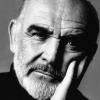I may be wrong in this, but James Bond doesn’t have much character, and the little he does have is never truly exploited. He seems to be fastidious, from his clothes and food to how he likes his cocktail. He even takes the adage ‘five a day’ to mean showers instead of vegetables. He’s also tough, snobby and dour. The rest of him is filled in with Fleming’s own attitudes and opinions, to the point where he becomes everything Fleming wished he could have been. Even his reminisces, such as his beach holiday memories at the beginning of On Her Majesty’s Secret Service, are Fleming’s, not Bond’s. He appears to be a cipher with aspirations to become a character. In the books, he is an avatar for Fleming, and characterised in the films by whoever plays him – if it’s acerbic Connery or the twinkly-eyed Moore – and, finally, he is our own avatar, our object of self-projection.
The films changed him slightly to make him more appealing to audiences: for example, he is witty – always something people wish they were – and smoother with the ladies. In place of more substantial characteristics, they put crowd-pleasing accoutrements like stunts, gadgets and cars – anything, in other words, to give the audience something to think of when they thought of this soulless cypher alternately dressing like an insurance broker or a guest at a royal wedding.
It seems there’s a great deal of effort by Eon when referring to Fleming’s work (and also by William Boyd in his press interviews for Solo) to make out as though the literary Bond was this deep, tortured character who hates himself more with every killing he causes. It’s become such a cliché to ‘go back to the spirit of Fleming’ that it’s anyone’s guess what it actually means. It sounds commendable, certainly, as is any stated intention by filmmakers to stay faithful to the original source, though it loses credibility when one actually pauses to think what is a spirit of Fleming and, if it’s in the room, is it holding its head in his hands and trying not to look at the Roger Moore section of the DVDs?
Is it the fight with a giant Octopus at the end of Doctor No? Or is it the more serious tone of From Russia with Love, in which Fleming was consciously trying to pen a ‘straight’ spy thriller in the mould of Graham Greene and Eric Ambler? This latter point also addresses another misgiving about his work and that is the unevenness.
Despite From Russia…., he was never as serious a writer as John Le Carre or Len Deighton or even Helen MacInnes, who often characterised her work with globe-trotting. Neither is it apparent that Fleming was in possession of a sense of humour. Consequently, he seems to fall between two stools. The repartee of the inherent in the films can be found more readily in The Saint novels, or any of the British thrillers of the 30s and earlier and even as far back as the Bulldog Drummond stories, at which point it turns into Wodehousian whimsy. It was the filmmakers, particularly Terrence Young, who put the wit – as effective, it proved, as the most lethal gadget – in Bond’s arsenal.
It was also in Drummond – and also the well-intentioned thuggery of Mike Hammer – in which Fleming found the elements he wanted for Bond. The megalomaniacal villains, meanwhile, can readily be sourced in Drummond’s nemesis Carl Peterson, Dr Fu Manchu, any number of high-minded rascals pitting themselves against Simon Templar, the rogues’ gallery of Sexton Blake villains and, in particular, Jules Verne’s atomic bomb thrillers Robur the Conqueror and Facing the Flag.
Despite such weak-footed derivation – other writers, after all, were making repeated visits to the same well, such as Desmond Cory, James Leasor, and a young Dennis Wheatley – it is Fleming who remains, thanks in no small part to the franchise which has constantly reminded audiences of the character he created. It is a sort of pseudo-snobbery, of course, in which some people disparage the films in favour of the books. This happens with almost all books, of course, as it currently is with Game of Thrones/A Song of Ice and Fire. The same continues to happen with Conan Doyle’s Sherlock Holmes stories, if not Agatha Christie’s Poirot. There’s an implication by such zealots that while brain-dead cinema-goers can chortle and cheer at the films – which, with their spectacular stunts and set-pieces, can almost be likened to the expertly-synchronised antics of a circus – it takes a mature and sensitive mind to appreciate the deep character that is the literary Bond. He is, supposedly, the object of a nationalistic double-standard, a government-funded killer who is forced to be as bad as the bad in order to overthrow them. But although such paradoxes are possible and even justified, they are never sufficiently addressed by Fleming to make them discernable in the actual novels. Instead, Fleming is too busy navigating his avatar towards the nearest dinner table to over-indulge on – of all things – scrambled eggs, or mutter something condescending about socialists.
Much has been made of the prevalent branding – perhaps the earliest product placement known to fiction – and the effect it must surely have had on the ration-bound British public. Indeed, Casino Royale was published a mere year before rationing ceased. It is perhaps Fleming’s claim to originality, aside from the ‘sex and sadism’ which has followed the books around like a secret agent stalking his target. While Fleming enjoyed fine food, it is doubtful that Fleming was fettishistic – as it is doubtful that he too slept with a gun under his pillow – and it can surely be seen as part of the same languid, occasionally frenetic, daydream his character drifts through. The sadism angle is curious in itself, as such sensationalism is usually the hallmark of pulp fiction, and despite the garish paperback Pan covers, the Bond books managed to be too ostentatious to be sensational and not literary enough to be treated respectfully all at the same time.
Despite this, it must be remembered, these books were major best-sellers in their time, even if their apparent immortality is perhaps undeserved. Their transformation from pulp to prestige is complete: from being available for the price of a packet of cigarettes at a newspaper stand and read with the cover turned back on the train from Paddington Station, to their present existence as ‘Penguin Classics’, read as audio books or performed for radio by respected thespians trying to convince themselves it is more savoury than that Man With the Golden Gun repeat they caught the previous afternoon. Furthermore, as played by Dominic Cooper, Fleming is perceived how he always wanted to be, as a Bond-like war hero, in the BBC mini-series. Ironically, after such ashamed belittling from his wife and her society friends, and even his own self-effacing flippancy, Ian Fleming and his novels are almost respectable.
Edited by DavidJones, 07 May 2014 - 08:37 PM.




